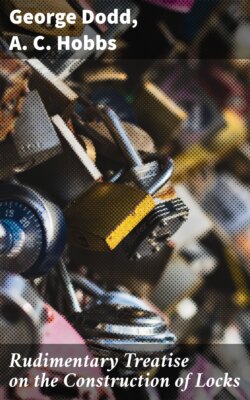Читать книгу Rudimentary Treatise on the Construction of Locks - Dodd George - Страница 4
На сайте Литреса книга снята с продажи.
ADVERTISEMENT.
ОглавлениеTable of Contents
The first edition of this volume, though at the date of its appearance co-ordinating with the state of knowledge of the period, and containing matter well arranged and lucidly described—as must have been expected from the reputation of its author—had, through the lapse of the few intervening years, inevitably become somewhat behind the state of the art of which it treats—one which is daily receiving the attentive consideration of many skilful men, and occasional marked improvements. Amongst those of later years none are more noteworthy than the locks patented by Mr. Fenby, of Birmingham; of these an account, with accurate illustrations, for which the drawings are supplied by the inventor, is now added,—together with a brief essay upon the important but popularly ill-understood subject of iron safes.
ROBERT MALLET.
April, 1868.
In reference to Mr. Smyth’s letter, which is given at pp. 130, 131, that gentleman is desirous to state that it was in consequence of the defects there pointed out that Mr. Hobbs was enabled to pick the Bramah lock operated upon, which had been manufactured forty years previously, when the sliders were made of iron instead of steel as they now are, and yet, notwithstanding that and the other defects pointed out, it took Mr. Hobbs sixteen days to pick it. In proof of the security of the Bramah lock, Mr. Smyth mentions that Mr. Hobbs’s best workman failed in picking an ordinary 3-inch Bramah box lock; and that a person in the employ of Messrs. Johnson and Ravey, of Conduit Street, failed also in his attempt to pick a 6-inch cellar-door lock, though he had the lock in his possession for twelve months, employing his evenings in making instruments and trying to pick it. Mr. Smyth contradicts the statement made at page 128, that the new lock was removed from the window through any fear of its being opened. On the contrary, it was put up especially to afford an opportunity for Mr. Hobbs to make, if he thought fit, another trial, and it remained in the window four months. The sole cause of its removal was to stop the impertinent applications of men and boys, which interfered too much with the general business of the firm.
